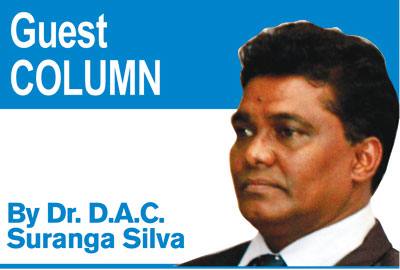Sri Lanka must customise traveller experiences
View(s):According to the UNWTO (UN World Tourism Organisation), sustainable tourism takes full account of its current and future economic, social and environmental impacts, addressing the needs of visitors, the industry, the environment and host communities. Furthermore, 2017 has been declared by the UN General Assembly as the International Year of Sustainable Tourism for Development recalling the potential of tourism to advance the Universal 2030 Agenda for Sustainable Development and the 17 Sustainable Development Goals (SDGs). According to the UN General Assembly held on 21 October 2015, under the new theme of “Transforming Our World: the 2030 Agenda for Sustainable Development”, 17 sustainable development goals and 169 targets will stimulate action over the next 15 years. In this context, 5 Ps are mainly considered as the indicators: People, Planet, Prosperity, Peace and Partnership. Furthermore the 2017 UNWTO International Year is to promote tourism’s role in five areas:
(1) Inclusive and sustainable economic growth;
(2) Social inclusiveness, employment and poverty reduction;
(3) Resource efficiency, environmental protection and climate change;
(4) Cultural values, diversity and heritage; and
(5) Mutual understanding, peace and security.
The most obvious outward and visible sign in global tourism at present is the emerging new type of tourists, whose preferences for, behaviour towards and values relating to the socio-culture and natural environment of their destinations are a fundamental guiding force for not only new type of tourism development but also for one of the most decisive factors for sustainable tourism development in Sri Lanka. The discovery of these global tourists’ needs, behavioural patterns and their decision processes is decisive for successful tourism product promotion, accurate branding, right positioning and DNA market segmentation and product diversification of Sri Lanka tourism. Understanding of these tourists’ behaviour and developing new tourism products and services is central for the success of attracting the high-end and affluent international tourists to Sri Lanka.
In parallel to such development, modern super technological and electronic highways offer these tourists access to a huge volume of information, serve to make these tourists more flexible and sophisticated consumers in tourism demand. Instead of demanding ready-made, mass-scale tours from the organised large-scale tour operators, tailor-made travel arrangements are now growing around the world. These new tourists are demanding more diverse, high quality and nature- and culture-based holiday experiences. They seek new experiences based holiday amenities.
One of the biggest challenges facing Sri Lanka tourism at present is how our country can meet these tourists’ demand ensuring sustainable tourism development.
Instead of the ‘sameness’ and ‘homogeneous’ mass tourism holiday demands, these tourists demand different kinds of experiences.
Therefore, competitive tourism strategies putting consumers first, developing radical innovations and strengthening the value chain are decisive strategies for sustainable tourism development. A more customised and more integrated tourism market is to be developed. The benefits of “scope economies”, economies associated with producing a range of items rather than producing a large quantity of identical units, are increasingly becoming highly decisive in the process of tourism development. Instead of mass production, mass customisation is to be important in the marketing of tourism. Tourism suppliers must shift away from the short-term profit motivational objectives to the longer-term sustainable and responsible objectives. All these improvements will keep our tourism industry away from a one-sided approach. Instead of promoting mass package tourism for 3S holidays (Sun, Sea and Sand), the diversification of tourism supply for several “H’s” (habitat, heritage, history, home and handicrafts) holidays is important to sustainable tourism development.
Moreover, different generations of the population have indicated different types of tourist behaviours. For an example, Baby Boomers (born between 1946 and 1964) are identified with different characteristics. They are continuous travellers, treating work and personal sacrifice as keys to success, prefer “classic” comfort foods and seek new places to visit that often are off the beaten path and avoid organised tours. Generation X (born between 1965 and 1979) is more associated with good foods with certain brands. They are family travellers and seek “package” tourism that are reasonably priced and convenient. Generation Y (born between 1980 and 1995/2000) are impulsive spenders and technologically savvy. They usually seek brands and fashions in tourism. These general gaps and specific requirements of tourists are to be clearly understood.
Changing different tourists’ behaviours under different generation can be seen from the behaviours of Hippies, Yuppies, Buppies and Dinkies and now Bobos (or Bourgeois Bohemian). ‘Bobos’ are a new upper class, have a highly tolerant views of others, and purchase expensive and exotic tourist products and services,. They are also meritocratic, but are experience seekers. They are more independent tourists expecting new types of holidays and novel experiences.
Even though tourism is probably one of the most promising and contributable single industries of the country, prioritisation on tourism research and innovation is currently indicating the relative underuse of research in the industry. Putting the right value for tourism research and innovation is one of the key tasks to be implemented when ensuring the competitive growth of the tourism industry and achieving sustainable tourism development in Sri Lanka.
The writer is the founder and coordinator of Master in Tourism Economics and Hotel Management, University of Colombo and the Secretary General of the Tourism Hospitality Educators and Researchers Association of Asia. He can be contacted at drsuranga3@gmail.com)


